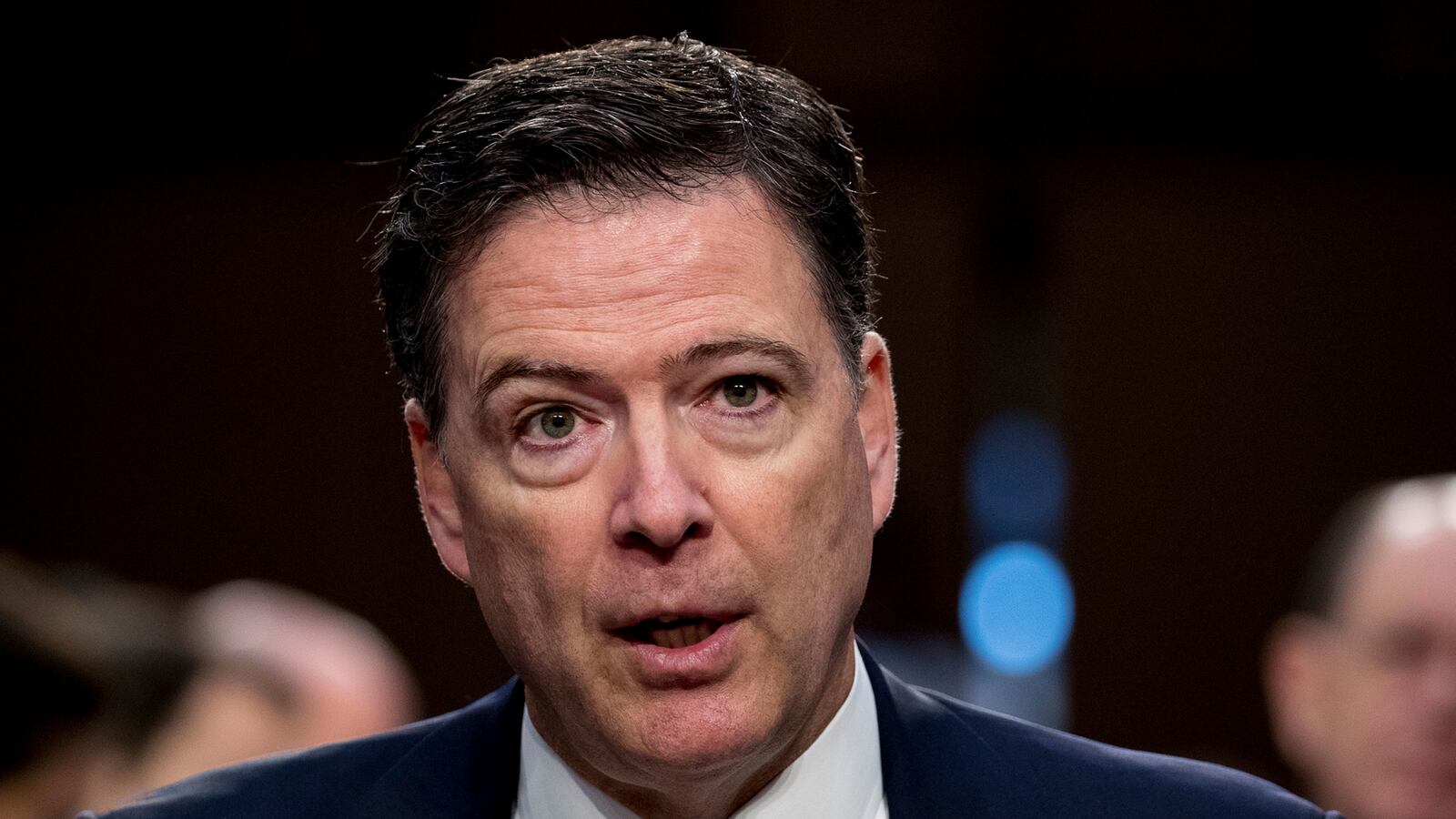In May 2017, President Donald Trump declared that “James Comey better hope that there are no ‘tapes’ of our conversations before he starts leaking to the press!”
One year later, no such tapes have materialized, but the American public has just been given access to the next best thing: 15 thorough pages of contemporaneous notes, taken by Comey in order to document his increasingly fractious encounters with Trump.
The Department of Justice delivered Comey’s memos to relevant congressional committees on Thursday, after House Judiciary Committee Chairman Bob Goodlatte (R-VA), Oversight Committee Chairman Trey Gowdy (R-SC), and Intelligence Committee Chairman Devin Nunes (R-CA) demanded their release, with Goodlatte going so far as to draft a subpoena to obtain them.
After consulting with “relevant parties,” Assistant Attorney General Stephen Boyd said in a statement, the Department of Justice “concluded that the release of the memoranda to Congress at this time would not adversely impact any ongoing investigation.”
The seven memos, written between January and April 2017, largely comport with Comey’s public statements detailing his tumultuous relationship with Trump—that he found the president obsessed with personal loyalty, frequently preoccupied with allegations of sexual impropriety lodged against him during the presidential campaign, and a habitual liar.
In the second memo, for example, written after a dinner for two in the Green Room of the White House, Comey noted that Trump told him that then-chief of staff Reince Priebus had no idea Comey was dining with him, before moments later telling him that Priebus did, in fact, know he was there. In their final conversation before Comey’s unceremonious firing, Comey wrote that Trump told him that “I have been very loyal to you, very loyal, we had that thing, you know.”
The memos do, however, appear to shed new light on how the nation’s top law enforcement official attempted to navigate interactions with a White House largely staffed—and helmed—by people unfamiliar with the day-to-day functioning of American government.
During that dinner, Comey noted, Trump said that then-national security adviser Michael Flynn “has serious judgment issues.” Flynn would resign from his position only weeks later, after press reports revealed undisclosed contacts with Russian officials, about which Flynn later lied during conversations with Vice President Mike Pence.
Trump “illustrated” Flynn’s judgment issues, Comey wrote, by relaying the national security adviser’s fumbling of a congratulatory call from Russian President Vladimir Putin, who waited six days for Trump to return his message.
“This isn’t [redacted nation] we are talking about,” Trump said, according to Comey, presumably referring to a world leader who could wait six days for the president to call him back.
“In telling the story, the president pointed his fingers at his head and said ‘the guy has serious judgment issues,’” Comey wrote. “I did not comment at any point during this topic and there was no mention or acknowledgment of any FBI interest in or contact with General Flynn.”
It wasn’t just Trump who breached traditional barriers between the White House and the FBI intended to maintain the bureau’s independence, Comey wrote. During his first one-on-one meeting with Priebus, Comey wrote that the White House chief of staff asked if Flynn was being monitored under a secret surveillance warrant.
“Do you have a FISA order on Mike Flynn?” Priebus asked, in reference to warrants obtainable under the Foreign Intelligence Surveillance Act, which allow for surveillance warrants to be signed against foreign spies inside the United States. Comey “paused for a few seconds and then said that I would answer here, but that this illustrated the kind of question that had been asked and answered through established channels.”
Comey’s response is redacted, although it was later revealed that Flynn was under FISA surveillance at some point.
Trump repeatedly, and without prompting, discussed allegations of sexual impropriety, and occasionally requested that Comey and the FBI help “lift the cloud” by investigating some of them, according to Comey. During their first meeting, Comey wrote, Trump “started talking about all the women who had falsely accused him of grabbing or touching them (with particular mention of a ‘stripper’ who said he grabbed her) and gave me the sense that he was defending himself to me.”
It is unclear to what the president was referring. There is no public record of a stripper accusing Trump of groping her.
Trump’s obsession with what he called “the golden showers thing,” according to Comey’s notes, was constant during his meetings with the FBI director. During an Oval Office meeting with Comey and Priebus, Trump reiterated that the accusations were “nonsense,” but also declared that “Putin had told him ‘we have some of the most beautiful hookers in the world.’” Comey parenthetically noted that Trump “did not say when Putin had told him this and I don’t recall.”
(Trump may have confused a remark Putin made in an interview with Bloomberg one month before with a private communication with the Russian president. In that interview, Putin said that while he found it “hard to believe” that Trump would need “to meet girls of loose morals… ours are undoubtedly the best in the world.”)
In a statement, Goodlatte, Gowdy, and Nunes said the publication of the memos demonstrate that Comey’s scorched earth book tour pegged to the publication of his memoir, A Higher Loyalty: Truth, Lies, and Leadership, is born of sour grapes.
“[Comey] was willing to work for someone he deemed morally unsuited for office, capable of lying, requiring of personal loyalty, worthy of impeachment, and sharing the traits of a mob boss,” the statement read. “Comey was willing to overlook all of the aforementioned characteristics in order to keep his job. In his eyes, the real crime was his own firing.”
In an interview on Thursday afternoon, ahead of the memos’ release, Comey said he was happy for Congress to have access to his notes.
“It’s fine by me,” Comey told CNN’s Jake Tapper. “I don’t care. I don’t have any views on it. I’m totally fine with transparency.”





